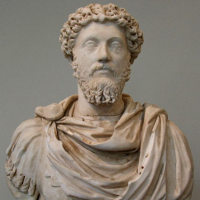Stoicism is a school of philosophy from ancient Greece, and it is not fully understood in modern thinking today. In the age of the Greek philosophical schools, they weren’t just a belief system. They were a way of life, and philosophers were very serious people like our scientists today. Science even started with them, and it was called natural philosophy.
Stoicism is sort of interesting in how it differs from other Greek schools. We get the word school from the Greek word schola. The Stoics were known as that because they met at a public “porch”, maybe like the term “armchair” philosopher today. But their meeting was very far from casual, and this is maybe how we get our modern understanding of the word “stoic”.
Would it have rituals in the way that a Masons meeting would? No, strictly not. They were not actually atheistic though. They saw the world as a unified whole, and its material manifestation as a reflection of a greater preceding truth. In a sense, a “God” that they saw as fire.
Big bang? Yes, and in their view all other forms took shape from that by a process they call pneuma, expansion, and contraction. Ah, spirit? Yes.
Now unlike a lot of Greek thinkers, the world isn’t “post-creation”, and in their view everything is alive and active because the creative action of the logos is still going on. The logos is synonminous with what could be called the Hegemon, the commanding principle or intelligence. Now they said that the reason for all suffering is a mistaken view of the truth represented by that first spirit, and that the ideal life and true freedom/liberation is to become aware of as much truth as possible. So they didn’t necessarily apply Occam’s razor, but were in a sense very minimalist thinkers. They believed that things like ambition, and lust, and the like, were distractions.
Where did that term “Occam’s razor” come from? It is a principle that states “do not assume the presence of more than is absolutely necessary to explain any observation”. Occam is a name, and razor because it’s an exclusionary principle.
The simplest answer tends to be the best one? Yes. Same basic principle, and a firm tenant of Stoicism.
So in Stoicism, they focused on understanding the creative force. God being the spirit that moves through all reality giving animation. By understanding the pneuma, they could understand the intention or truth behind any form. I don’t recall their word for the pneuma of objects, but they applied the same term to plants. The pneuma in animals was called psyche or soul. Soul was the force that could empower one to be an actor where other things were acted upon. To the Stoics, attachment was mistaken, because it was assigning a power to act upon to objects. Like saying your food makes you eat it, they just saw it as illogical. So they did believe that you need to minimize any of that sort of behaviour. Basically, a moderation in all things sort of view.
They sound just like Vulcan’s from Star Trek. Attachment of any kind is very unvulcan? They basically were, but it was believed that with that clarity of perception no misfortune could come to you, and only in this way could you be happy.
The ideas of Stoicism permeate society quite a bit? Yes, but in no official sense. What we have of the original principles of Stoicism is second hand and sort of distorted, but was appropriated in a lot of other philosophical views.
Your thoughts are welcome. Be well friends.
Travis Saunders
Dragon Intuitive
~science,mysticism,spirituality~


